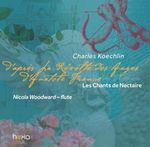|
Back
10/10/2020
Charles Koechlin: Les Chants de Nectaire First Series, opus 198: “Préambule” – “Naissance de la vie” – “Jeux de lumière” – “Clartés de l’Esprit” – “Jeunesse du monde” – “Les Tranquilles clartés de l’Intelligence” – “...criblent de flèches l’Erreur et la Bêtise” – “Le Rire vainqueur” – “Gaîté de la lumière” – “Les Vaines querelles (« à quoi bon? ») – “La Tendresse” – “La Plainte humaine” – “La Nuit” – “Souffles du printemps sur la mer” – “Lumière – modération – équilibre” – “L’Amour” – “La Pitié” – “Pour les âmes souffrantes” – “Les Jardins des Muses” – “Les Vrilles de la vigne” – “Les Heures douces” – “La Crainte” – “Idylle” – “Clair de lune sur la mer” – “L’Elan vers la vie” – “«Le Désir qui créé les Mondes»” – “L’Effort de l’Homme” – “Le Vaincu médite” – “Le Soir” – “Le Calme du Sage” – “Gaîté du matin ensoleillé” – “Méditation sur la douleur humaine”
Nicola Woodward (flute)
Recording: Clifton Cathedral, Bristol, England (August 2019 – February 2020) – 71’24
Hoxa Sound HS190206 (Distributed by Naxos of America) – Notes in English

   
Charles Koechlin’s passions were vast and eccentric, including obsessions with film stars, such as Lillian Harvey and Ginger Rogers and strong affinities towards astronomy, science, literature and medieval music. Studying under Massenet and Fauré at the Paris Conservatoire, his musical individuality turned [to] impressionism with an ability to pen compositions with atmospheric release, no matter the subject chosen.
Koechlin was also charmed by French writer Anatole France, specifically, La Révolte des anges, and one of its characters, the sage flute player, Nectaire. While these reedless instruments give heady lift to many a classical composition, a pure flute concentrate is a rarity. Nicola Woodward is one of those master scholars who’s been able to give an intelligent reading of Koechlin’s œuvres (all 96 songs) that’s amassed under three opuses. This is the first of three releases.
Throughout these 32 pieces, Charles Koechlin depicted incorporeal subjects...nothing concrete. This is where vagueness abounds and emotion lets loose. Simultaneously, however, it gives a cast iron strength to an imagery being depicted. Nicola Woodward’s breath control and timbre remarkably emote the situation at hand.
What’s the vibe? Each Nectaire idea pervades the mind and solidifies...it is timeless. Much of Les Chants de Nectaire is atonal, conjuring meaningful ambiguity. For example, the opening “Préambule” has a smokier, woodier texture, following along the tangent of Debussy’s Syrinx. Mlle Woodward is forever controlling the conditions of the music with distance and unsettlement.
Camouflaged moments appear at each turn of a composition: while logically comprehensible, an uncertainty congeals. Even the “not-so-subtle” patterns occasionally surface. Noteworthy is the pairing of XI [“La Tendresse”] with XVII [La Pitié] and its half step/whole step combinations: it becomes intoxicating and hallucinogenic. Even the concluding “Méditation sur la douleur humaine” [XXXII] has that same course; however, the plight of sorrow reaches to an apex of “piercing astringency” in the middle section...the tumult hits like a lead balloon.
Thin Ravellian fixes can be heard during “Souffles du printemps sur la mer” [XIV] while the seascape vogue dominates with deeper transparency inside “Clair de lune sur la mer” [XXIV]; Koechlin’s writings are more freely written upon discovering “Pour les âmes souffrantes” [XVIII].
A Zen-like quality constantly surrounds the ear. One can distinctly discern this quality during “La Nuit” [XIII] and its forward-carry into the nebulous “Le Soir” [XXIX]. Contrastingly, frivolity and carefree ruminations run the gamut during “Gaîté de la lumière” [IX], “Jeux de la lumière” [III], and “Gaîté du matin ensoleillé” [XXXI].
Nicola Woodward’s advantage is her acute sense of heightened persuasion, as if to not deny the ability of carrying a state of temperament forward without a prior period of thought. Many of Koechlin’s lines have plenty of alien pointillism attached as well.
While the listener is in a “virtual guessing game bubble”, this is where Charles Koechlin’s distant auras begin to successfully suffuse the mind...threating, yes...optimistic, at times...assuring, occasionally. To that extent, Nicola Woodward's decisive instructions re-awaken the soul of Charles Koechlin.
Christie Grimstad
|